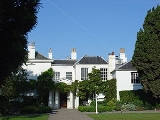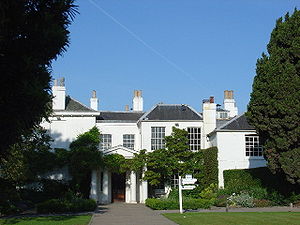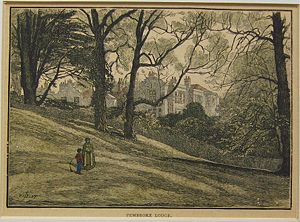
Pembroke Lodge, Richmond Park
Encyclopedia

Georgian era
The Georgian era is a period of British history which takes its name from, and is normally defined as spanning the reigns of, the first four Hanoverian kings of Great Britain : George I, George II, George III and George IV...
mansion in Richmond Park
Richmond Park
Richmond Park is a 2,360 acre park within London. It is the largest of the Royal Parks in London and Britain's second largest urban walled park after Sutton Park, Birmingham. It is close to Richmond, Ham, Kingston upon Thames, Wimbledon, Roehampton and East Sheen...
, London. It is located on high ground with spectacular views across the Thames valley to Windsor
Windsor, Berkshire
Windsor is an affluent suburban town and unparished area in the Royal Borough of Windsor and Maidenhead in Berkshire, England. It is widely known as the site of Windsor Castle, one of the official residences of the British Royal Family....
and Surrey
Surrey
Surrey is a county in the South East of England and is one of the Home Counties. The county borders Greater London, Kent, East Sussex, West Sussex, Hampshire and Berkshire. The historic county town is Guildford. Surrey County Council sits at Kingston upon Thames, although this has been part of...
. It has eleven acres (45,000 m²) of beautifully landscaped grounds, including King Henry VIII's Mound.
The Lodge began life, sometime prior to 1754, as a humble cottage of one room, occupied by a molecatcher whose sole duty was to reduce the peril presented to huntsmen by moles. This cottage was enlarged to form a dwelling with four principal rooms and renamed Hill Lodge. It was granted to the Countess of Pembroke, a "close friend" of King George III
George III of the United Kingdom
George III was King of Great Britain and King of Ireland from 25 October 1760 until the union of these two countries on 1 January 1801, after which he was King of the United Kingdom of Great Britain and Ireland until his death...
, at her request in 1787. Between 1788 and 1796 she extended the building to form the entire Georgian wing and part of the north wing.
In 1847, Queen Victoria
Victoria of the United Kingdom
Victoria was the monarch of the United Kingdom of Great Britain and Ireland from 20 June 1837 until her death. From 1 May 1876, she used the additional title of Empress of India....
granted the Lodge to Lord John Russell
John Russell, 1st Earl Russell
John Russell, 1st Earl Russell, KG, GCMG, PC , known as Lord John Russell before 1861, was an English Whig and Liberal politician who served twice as Prime Minister of the United Kingdom in the mid-19th century....
, then Prime Minister, who conducted much government business there and entertained
Queen Victoria, foreign royalty, aristocrats, writers (Dickens,
Thackeray
William Makepeace Thackeray
William Makepeace Thackeray was an English novelist of the 19th century. He was famous for his satirical works, particularly Vanity Fair, a panoramic portrait of English society.-Biography:...
, Longfellow
Longfellow
Longfellow may refer to:* Longfellow, Minneapolis, United States** Longfellow , Minneapolis, United States* Longfellow, Oakland, California, United States* Longfellow , one of America's first great thoroughbred racehorses...
, Tennyson
Alfred Tennyson, 1st Baron Tennyson
Alfred Tennyson, 1st Baron Tennyson, FRS was Poet Laureate of the United Kingdom during much of Queen Victoria's reign and remains one of the most popular poets in the English language....
) and other notables of the time,
including Garibaldi
Giuseppe Garibaldi
Giuseppe Garibaldi was an Italian military and political figure. In his twenties, he joined the Carbonari Italian patriot revolutionaries, and fled Italy after a failed insurrection. Garibaldi took part in the War of the Farrapos and the Uruguayan Civil War leading the Italian Legion, and...
. Lord John was much taken with the Lodge – "an asset that could hardly be equalled, certainly not surpassed in England." Earl Russell (as he had become) died there on 28 May 1878; Fanny, his second wife, in 1898. Their daughter Lady Agatha Russell
Lady Agatha Russell
Lady Agatha Russell was the daughter of the 1st Earl Russell and Frances, the Countess of Russell, and the aunt of Bertrand Russell. She was the co-editor of her mother's posthumously published memoirs, Lady John Russell: A Memoir with Selections from Her Diaries and Correspondence.-Further...
left a memorial, still standing in the rose garden: "Pembroke Lodge 1847–1902 — In loving memory of my Father and Mother, Lord and Lady Russell and of our supremely happy home at Pembroke Lodge."

Bertrand Russell
Bertrand Arthur William Russell, 3rd Earl Russell, OM, FRS was a British philosopher, logician, mathematician, historian, and social critic. At various points in his life he considered himself a liberal, a socialist, and a pacifist, but he also admitted that he had never been any of these things...
, the philosopher and mathematician, who grew up there between 1876 and 1894. At "PL", he wrote, "I grew accustomed to wide horizons and to an unimpeded view of the sunset." In 1911 the occupant was the Dowager Duchess of Dudley. During World War II, the GHQ Liaison Regiment
GHQ Liaison Regiment
GHQ Liaison Regiment was a special reconnaissance unit first formed in 1939 during the early stages of World War II and based at Pembroke Lodge, a Georgian house in Richmond Park, London.- History :...
(also known as Phantom) established its RHQ at Pembroke Lodge. Some of the members of the squad went on to become privy councillors, law lords, judges, MPs, a commissioner of the Metropolitan Police
Metropolitan police
Metropolitan Police is a generic title for the municipal police force for a major metropolitan area, and it may be part of the official title of the force...
Sir Robert Mark, and actors – including David Niven
David Niven
James David Graham Niven , known as David Niven, was a British actor and novelist, best known for his roles as Phileas Fogg in Around the World in 80 Days and Sir Charles Lytton, a.k.a. "the Phantom", in The Pink Panther...
, who remarked in a letter, "these were wonderful days which I would not have missed for anything."
Thirty-five years ago, Pembroke Lodge offered the visitor a government-run tea room. Now in private hands and restored to its former architectural glory, Pembroke Lodge is open to the public for
refreshments, weddings and conferences.

